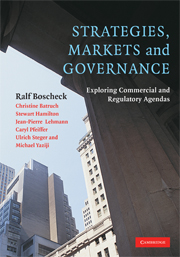Book contents
- Frontmatter
- Contents
- List of Figures, Boxes and Tables
- Acknowledgments
- Preface
- Notes on Contributors
- Part I Introduction and overview
- Part II Firm-level
- Part III Industry-level
- Part IV Country/International level
- 13 Governing oil supply: Fiscal regimes, NOCs and the steering of resource-based economies
- 14 China – External imperatives and internal reforms
- 15 EU constitutional governance: Failure as opportunity!?
- 16 One competition standard to regulate global trade and protection?
- Part V An observation in closing
- Index
16 - One competition standard to regulate global trade and protection?
Published online by Cambridge University Press: 06 July 2010
- Frontmatter
- Contents
- List of Figures, Boxes and Tables
- Acknowledgments
- Preface
- Notes on Contributors
- Part I Introduction and overview
- Part II Firm-level
- Part III Industry-level
- Part IV Country/International level
- 13 Governing oil supply: Fiscal regimes, NOCs and the steering of resource-based economies
- 14 China – External imperatives and internal reforms
- 15 EU constitutional governance: Failure as opportunity!?
- 16 One competition standard to regulate global trade and protection?
- Part V An observation in closing
- Index
Summary
On August 1, 2004, the WTO General Council's decision to implement the Doha Work Program fell notably short of the “breakthrough” they were proclaimed to achieve. To be sure, only two years after quarrels over including competition policy in the “millennium trade negotiation round” had brought the WTO Seattle summit to a sudden halt, the Doha Declaration of 2001 put the issue back on to the agenda. But already at the Fifth Ministerial Conference at Cancun in September 2003, competition policy concerns were separated from central deliberations, making it easy to exclude them altogether from the 2004 WTO implementation plan. By November 2005, WTO ministerial declarations no longer identified respective liberalization targets, but clearly reflected reduced ambitions. The significance of these events is often missed.
For nearly a decade, the EU and Japan had argued for an extension to the scope of GATT/WTO law, from its focus on public border measures to those domestic policies and private actions threatening to foreclose markets and distort competition. In their view, WTO members needed to enforce competition rules in line with shared principles for cases with an international dimension and to agree to agency cooperation and binding dispute settlement. All along, US trade representatives accepted the need for collaboration among authorities but saw no merit in a trade-focused forum setting competition standards, or “second-guessing complex national prosecutorial decisions.
- Type
- Chapter
- Information
- Strategies, Markets and GovernanceExploring Commercial and Regulatory Agendas, pp. 301 - 318Publisher: Cambridge University PressPrint publication year: 2008

